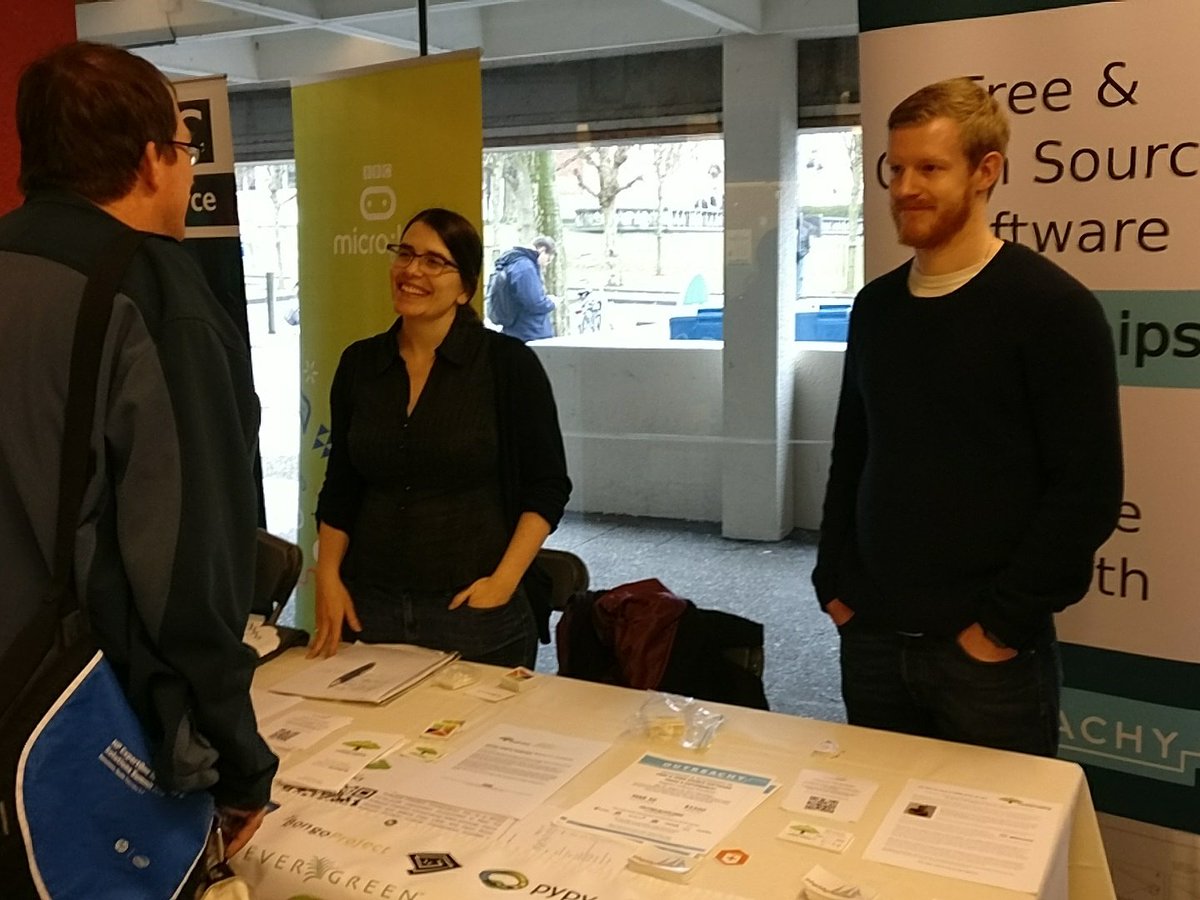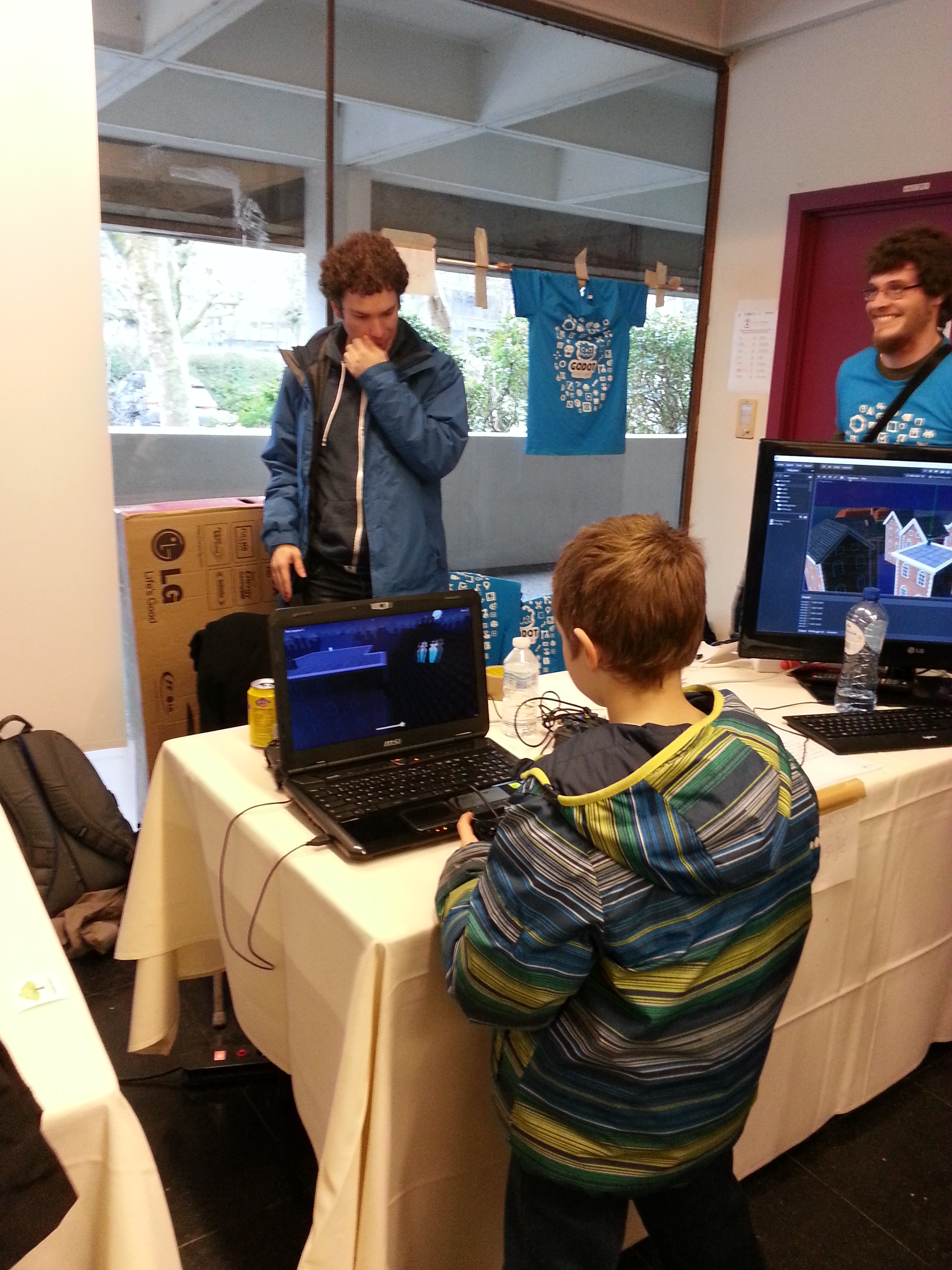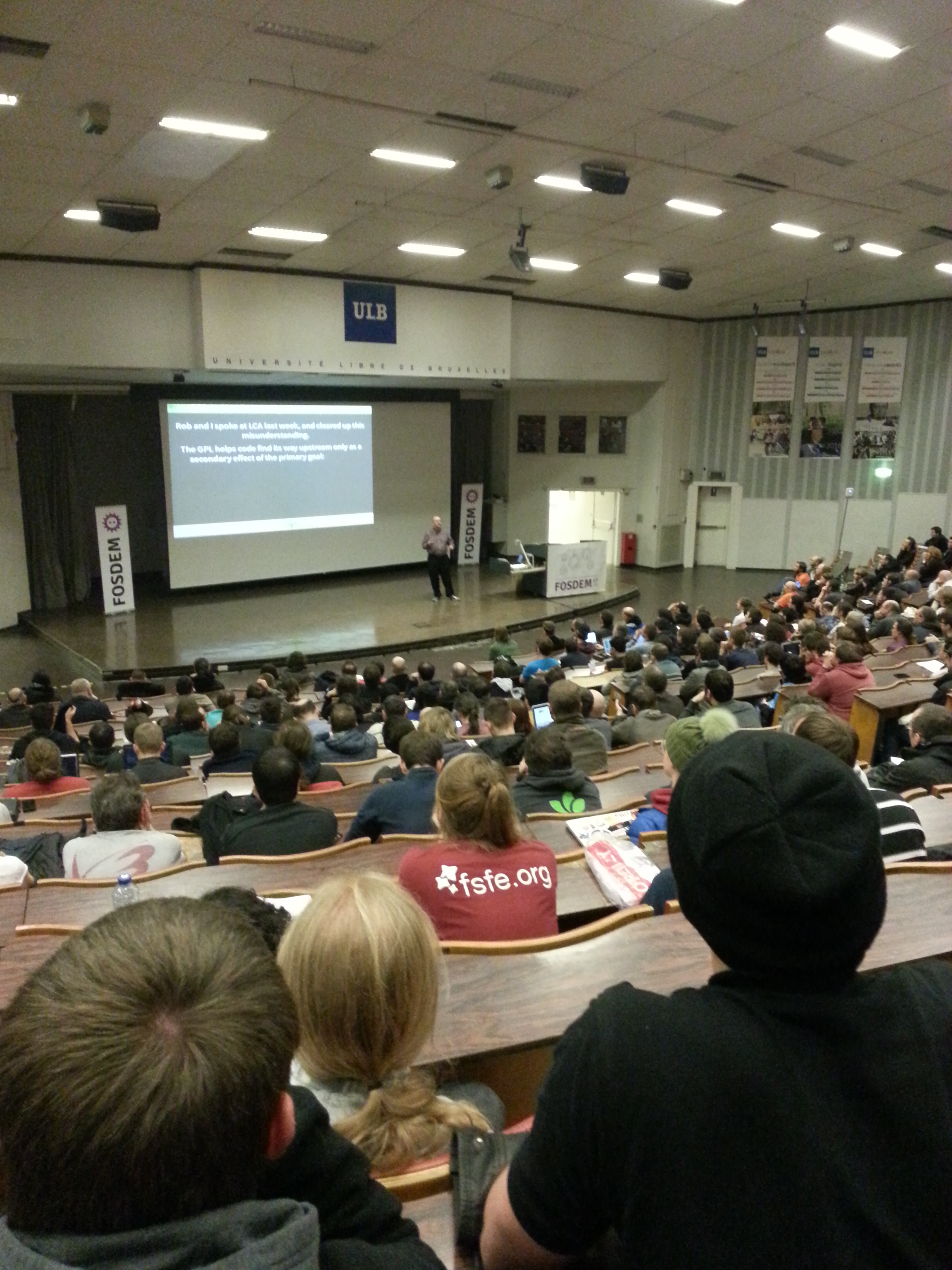![[RSS]](/static/img/feed-icon-14x14.2168a573d0d4.png) Conservancy Blog
Conservancy Blog
Displaying posts
tagged conservancy
![]()
Git Merge and FOSDEM 2017!
by on February 17, 2017
For me, FOSDEM this year started two days early with Git Merge, the annual Git conference. Git Merge is organized by GitHub, and so far in all three years of its organization the conference has donated the proceeds from ticket sales to Conservancy! I’d been hoping to get to Git Merge one of these years, so I was very excited with the organizing team asked me to do an talk introducing Conservancy.
I got to kick off the conference, and introduced myself by explaining how investigating my heart condition and defibrillator caused me to become passionate about software freedom. I then delved into what Conservancy does and in particular talked about some of the work we’ve done with Git. The talk had a good impact, and all day long I was able to speak with people who were excited about Conservancy and thinking about the ethics of all of our software. It’s always especially thrilling to speak at our member projects’ conferences. I love meeting up with leadership committee members and also putting faces to the names that we see go by while monitoring the activities of our projects.

Photo by Neil McGovern
FOSDEM is an extraordinary conference. A two-day whirlwind of activity, there are many more worthwhile things there than any one person can get to. The whole conference is completely community run and organized. Companies can buy neither stands nor talks in any of the devrooms, which keeps the quality really high. Thousands of people attend FOSDEM and there are great conversations happing everywhere. I find it incredibly difficult to balance seeing people, attending talks (even in my own devroom) and keeping the Conservancy stand running.
Fortunately for us, the FOSDEM organizers were very thoughtful and placed the Conservancy stand just across the hallway from the Legal & Policy devroom, which Bradley and I help organize. I spent most of the time running between the short distance between the two.

One of the major highlights for me was being at the stand with volunteers. Mike McQuaid (of Homebrew, another member project) and Spencer Krum both spent significant time at the booth loudly heckling people into becoming Conservancy Supporters. Stefan Hajnoczi (of QEMU, also a member project) took a quieter but no less dedicated approach. Michal Čihař spent a huge portion of his conference in our booth helping to promote phpMyAdmin and Conservancy. Having people who are giving of their time already so eloquently advocating for our organization was powerful, and helped me feel so energized about Conservancy. We’d launched our match donation that day, and I think it generated a lot of excitement at the booth. We also were lucky to be right next to the stand for one of Conservancy’s newer projects, the Godot Game Engine, which was very fun and convenient.
The Legal & Policy devroom is always fantastic, and while I wound up at the stand and in meetings for much of my time at FOSDEM, I still participated enough to really get a lot out of it. I spoke on a panel about permissive/dismissive licenses and another about fiscal sponsorship entities in Europe. FOSDEM video volunteers have been great, and video is already up for most of the sessions. A huge shout out to Tom Marble who does most of the heavy lifting in organizing the room. There are a lot of great places to discuss imporant legal issues but the FOSDEM devroom is one of my favorites. The talks this year were particularly interesting. I’m looking forward to catching up on the videos of the ones I missed.

I also really enjoyed Bradley’s keynote (we closed the stand down a little early so that we could all attend). Bradley is such an inspiring speaker, and I think he distilled a lot of the major issues facing copyleft and copyleft compliance.
I think part of the magic of FOSDEM is that it’s contained in a single weekend. While it’s inevitable to feel like you wished there were more time to catch up with all of the exceptional people who attend, and it’s exhausting to have no downtime over two days (I even missed the GNOME beers!) it’s just the right amount of time to fully immerse yourself in all things free software.
Software Freedom Can Avoid the Looming Dystopia
by on February 14, 2017
I encourage all of you to either listen to or read the transcript of Terry Gross' Fresh Air interview with Joseph Turow about his discussion of his book “The Aisles Have Eyes: How Retailers Track Your Shopping, Strip Your Privacy, And Define Your Power”.
Now, most of you who read my blog know the difference between proprietary and Free Software, and the difference between a network service and software that runs on your own device. I want all of you have a good understanding of that to do a simple thought experiment:
How many of the horrible things that Turow talks about can happen if there is no proprietary software on your IoT or mobile devices?
AFAICT, other than the facial recognition in the store itself that he talked about in Russia, everything he talks about would be mitigated or eliminated completely as a thread if users could modify the software on their devices.
Yes, universal software freedom will not solve all the worlds' problems. But it does solve a lot of them, at least with regard to the bad things the powerful want to do to us via technology.
Supporting Conservancy Makes a Difference
by on February 13, 2017
There are a lot of problems in our society, and particularly in the USA, right now, and plenty of charities who need our support. The reason I continue to focus my work on software freedom is simply because there are so few focused on the moral and ethical issues of computing. Open Source has reached its pinnacle as an industry fad, and with it, a watered-down message: “having some of the source code for some of your systems some of the time is so great, why would you need anything more?”. Universal software freedom is however further from reality than it was even a few years ago. At least a few of us, in my view, must focus on that cause.
I did not post many blog posts about this in 2016. There was a reason for that — more than any other year, work demands at Conservancy have been constant and unrelenting. I enjoy my work, so I don't mind, but blogging becomes low priority when there is a constant backlog of urgent work to support Conservancy's mission and our member projects. It's not just Conservancy's mission, of course, it's my personal one as well.
For our 2016 fundraiser, I wrote last year a blog post entitled “Do You Like What I Do For a Living?”. Last year, so many of you responded, that it not only made it possible for me to continue that work for one more year, but we were able to add our colleague Brett Smith to our staff, which brought Conservancy to four full-time staff for the first time. We added a few member projects (and are moving that queue to add more in 2017), and sure enough — the new work plus the backlog of work waiting for another staffer filled Brett's queue just like my, Karen's and Tony's was already filled.
The challenge now is sustaining this staffing level. Many of you came to our aid last year because we were on the brink of needing to reduce our efforts (and staffing) at Conservancy. Thanks to your overwhelming response, we not only endured, but we were able to add one additional person. As expected, though, needs of our projects increased throughout the year, and we again — all four of us full-time staff — must work to our limits to meet the needs of our projects.
Charitable donations are a voluntary activity, and as such they have a special place in our society and culture. I've talked a lot about how Conservancy's Supporters give us a mandate to carry out our work. Those of you that chose to renew your Supporter donations or become new Supporters enable us to focus our full-time efforts on the work of Conservancy.
On the signup and renewal page, you can read about some of our accomplishments in the last year (including my recent keynote at FOSDEM, an excerpt of which is included here). Our work does not follow fads, and it's not particularly glamorous, so only dedicated Supporters like you understand its value. We don't expect to get large grants to meet the unique needs of each of our member projects, and we certainly don't expect large companies to provide very much funding unless we cede control of the organization to their requests (as trade associations do). Even our most popular program, Outreachy, is attacked by a small group of people who don't want to see the status quo of privileged male domination of Open Source and Free Software disrupted.
Supporter contributions are what make Conservancy possible. A year ago, you helped us build Conservancy as a donor-funded organization and stabilize our funding base. I now must ask that you make an annual commitment to renewal — either by renewing your contribution now or becoming a monthly supporter, or, if you're just learning about my work at Conservancy from this blog post, reading up on us and becoming a new Supporter.
Years ago, when I was still only a part-time volunteer at Conservancy, someone who disliked our work told me that I had “invented a job of running Conservancy”. He meant it as an insult, but I take it as a compliment with pride. In fact, between me and my colleague (and our Executive Director) Karen Sandler, we've “invented” a total of four full-time jobs and one part-time one to advance software freedom. You helped us do that with your donations. If you donate again today, your donation will be matched to make the funds go further.
Many have told me this year that they are driven to give to other excellent charities that fight racism, work for civil and immigration rights, and other causes that seem particularly urgent right now. As long as there is racism, sexism, murder, starvation, and governmental oppression in the world, I cannot argue that software freedom should be made a priority above all of those issues. However, even if everyone in our society focused on a single, solitary cause that we agreed was the top priority, it's unlikely we could make quicker progress. Meanwhile, if we all single-mindedly ignore less urgent issues, they will, in time, become so urgent they'll be insurmountable by the time we focus on them.
Industrialized nations have moved almost fully to computer automation for most every daily task. If you question this fact, try to do your job for a day without using any software at all, or anyone using software on your behalf, and you'll probably find it impossible. Then, try to do your job using only Free Software for a day, and you'll find, as I have, that tasks that should take only a few minutes take hours when you avoid proprietary software, and some are just impossible. There are very few organizations that are considering the long-term implications of this slowly growing problem and making plans to build the foundations of a society that doesn't have that problem. Conservancy is one of those few, so I hope you'll realize that long-term value of our lifelong work to defend and expand software freedom and donate.
Why I Support Conservancy—and Joined Its Board
by on February 8, 2017
When Karen first approached me about joining Software Freedom Conservancy’s board, I tried to think about when I first became aware of the organization. I think it probably involves some non-profit law geeking out somewhere at a conference. As someone who has started and been involved in a few non-profits in their early days I think the services Conservancy provides to Free and Open Source Software (FOSS) projects are crucial. Many groups simply want to focus on developing software, rather than the legal and infrastruture tasks required to set up an entire legal entity. It adds another layer of complexity beyond simply organizing code and humans towards a common goal. This is one of the reasons I decided to join Conservancy’s Board of Directors.
One project I’m passionate that we provide a home to is Outreachy. I first became a user of FOSS in 2000 or so. I installed Mandrake Linux on my laptop and starting using it for everything. I was also a Computer Science student at the time. I spent much of that time feeling different while I sat in classrooms with almost entirely white men. I took a break from trying to use Mandrake when my computer ate my term paper and I moved over to studying Geography. I didn’t really return to free software again for 7 years. After graduating from college I worked primarily as a .NET programmer. I then started contributing to a JavaScript library, later got involved in OpenStreetMap and began working on FOSS full-time in various capacities. I think back and wish something like Outreachy had been there to help get me started. I’m delighted that I can support it today.
To make the “F” in FOSS truly free we need people to be able represent the groups making the software we want the world to use. The only way to do that is to get more people involved. Supported, paid internships is part of the way to make this happen. Conservancy is the home for Outreachy and a vital part of this work. I’m delighted I can support that, hopefully making it easier for others to learn and get involved than it was for me.
I hope you are able to help support us in our fundraising drive and can afford to give this year. Currently an anonymous donor is matching 150 Supporter sign-ups and we have plenty of spots left to go. Will one be you? My Supporter sign-up is already matched!
Next page (older) » « Previous page (newer)
1 2 3 4 5 6 7 8 9 10 11 12 13 14 15 16 17 18 19 20 21 22 23 24 25 26 27 28 29 30 31 32 [33] 34 35 36 37 38 39 40 41 42 43 44 45 46 47 48 49 50 51 52
